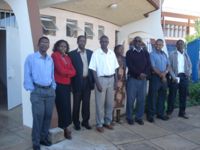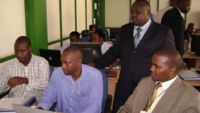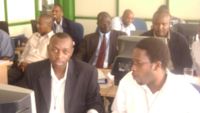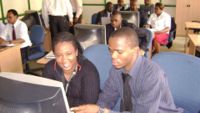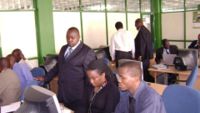KU and JKUAT Learning4Content Report
Contents
Introduction
Kenya becomes the first African country to conduct its two (2) Learning4Content training workshops. These workshops were held at the Kenyatta University and at the Jomo Kenyatta University of Agriculture and Technology. A total of 30 participants were trained on WikiEducator. These workshops were conducted by Nicholas Kimolo who is a certified WikiArtist. The workshops attracted interest to the ongoing work in WikiEducator and the participants were made aware of the impact of using the Wiki Technology in preparing their educational materials and in interacting with their students.
The following is a brief report on the workshop proceedings and the training outcomes.
Workshop Proceedings
The workshop was officially opened by various representatives from the respective University. The KU official was Dr. Speranza Ndege who is the University's Director of eLearning. JKUAT on the other hand was opened by the Dr. Ronald Waweru, who is the JKUAT's Director of the Institute of Computer Science and Information Technology(ICSIT). Both the facilitator and the participants then agreed on a plan of action which was guided by the WikiEducator Tutorials. Generally the training agenda had the following agenda:
- Impact skills on online content development using the Wiki and Web 2.0 Technologies
- Bring participants together to join with other educational practitioners globally in the development of shared Open Educational Resources (OERs).
- Introduce participants to the WikiEducator and FLOSS4Edu Inititatives and how they can be of positive impact to the University as a whole.
- Obtain practical hands-on skills to develop and publish educational content within the WikiEducator platform according to the WikiEdutator OER Training kit. See here for the workshop toolkit
Taking into account that in both the institutions we do not have stable internet (as is common in this area), we installed a standby wiki installation where the participants could work on with minimal interruptions. The facilitator started by introducing wikieducator and the FLOSS4Edu initiative and outlined their objectives and asked participants to consider the power of OER’s for Africa. Various licensing options for content development purposes were also discussed and it was impressed on the participants to use the CC-BY-SA license whenever publishing in WikiEducator.The Facilitator then focused on the practical use of WikiEducator. Each of the participants had access to a computer (though some shared) with network connectivity to access the local server.
The training was conducted for three (3) days at each of the institutions focussing on mostly practical work relating to publishing on content on the WikiEducator.
Workshop Strategic Outcomes
The following were the outcomes of this workshop:
- The workshops were able to produce 18 lessons/articles on various aspects that the participants were interested in. It was agreed that the participants will continue working on the content to improve it and to add on to it. The content published during this training is available here
- Two OER content development groups were established for the Universities. Each of the groups will work on forming a community of WikiEducators within the Universities. They will continue to recruit more educational practitioners to the WikiEducator through advocacy and participation. They also agreed to introduce their students to the WikiEducator platform;
- The participants agreed to share and evaluate the OER training kit and the training materials so developed in the toolkit to organize their own internal WikiEducator capacity building workshops;
- The participants highlighed the importance of advocacy to all the Universities and other educational institutions across the country. They suggested that we should start discussions on the possibility of organising a WikiEducator/FLOSS4Edu conference to sensitize senior management of the University on the relevance of this technology to teaching.
Lessons Learned
Most of the participants in this workshop were educational Practioners from Universities and Research Institutions not used to the development of educational content in an open manner. As a result, developing content as OER will be a new phenomenon which naturally will make them hesitant. To address this issue, it is important to get to know the participant’s fears and try to address them at the beginning of the workshop. Some of the common fears highlighted are:
- Loss of intellectual property rights
- No "immediate" financial reward
- Accessibility issues and the lack of computing resources including bandwidth and computers.
